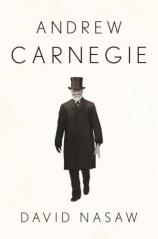Andrew Carnegie
Review
Andrew Carnegie
Andrew Carnegie arrived in the United States from his native
Scotland in 1848 as an unschooled and aimless 13 year old, became
immensely wealthy at 26, retired from full-time work at 37,
revolutionized the structure and working methods of the American
steel industry, pestered five or six Presidents with unwanted
advice on how to do their jobs, and died at 84 as the head of a
philanthropic empire that girdled the globe and is even today a
presence in many different areas of society.
On the surface his life is the classic American rags-to-riches
success story. David Nasaw, a history professor at the City
University of New York, tells it with flavor and gusto in this
blockbuster book --- but he also attempts the far more difficult
task of explaining the man himself.
In many ways the man Carnegie was far more interesting than what he
accomplished. His boundless self-confidence, charm and infectious
optimism helped to bring him his millions every bit as much as did
the wheeling and dealing of his business transactions. He started
out as a bobbin boy in a Pittsburgh cotton mill, working his way up
the economic ladder through a gift for befriending people who could
do him good, and ended up dominating the American steel industry
from his castle in Scotland.
All his life, he liked to portray himself as a former workingman,
though his experience of that sort lasted only a teenage year or
two. He kept publicly proclaiming sympathy for the laboring classes
even as he depressed wages, broke unions, forcibly suppressed
strikes and imposed longer working hours.
He developed a systematic rationalization for these tactics and put
them into a book called THE GOSPEL OF WEALTH. It was his sacred
duty, he felt, to amass the greatest possible wealth so he could
eventually give it all away for the betterment of mankind.
Once he discovered to his surprise that shrewd investments could
make a man wealthy, he disputed the idea that hard work was really
a necessity for success in life.
He paid for 1,689 public libraries in the USA and over 800 in other
countries. He bestowed money on schools that met his standards, on
organizations working for world peace and on a long list of other
projects. In all, Nasaw estimates, he gave away some $350 million,
which would amount to many billions in today's terms. He reasoned
that workers under his control had a duty to accept low wages so he
could amass this fortune and use it to make the world a better
place. It was reasoning that many found impossible to accept.
David Nasaw has unearthed more facts about Carnegie and his career
than anyone else. He tries very hard not to take sides in judging
Carnegie the man, allowing his many critics and detractors to have
their say. We hear in these pages from people like Mark Twain,
Theodore Roosevelt and Matthew Arnold, who knew him well but did
not always judge him kindly. Among Carnegie's business associates
there were many who admired him, but many others who fought him
bitterly. He exasperated five Presidents with his unsolicited
advice.
Nasaw emphasizes, among many other things, Carnegie's attraction to
the evolutionary philosophy of the dour Englishman Herbert Spencer.
It was inevitable, Spencer felt, that mankind and society would
evolve upward through ever-higher stages of organization and
intellect, until perfection was in sight. Carnegie took that idea
one step further --- if a few unlucky souls had to suffer along the
way, too bad. The intelligent managers and leaders --- the Andrew
Carnegies of this world --- had a duty to keep this process going,
and they deserved to be rewarded for their superior status.
At times this book can be hard going for the reader. Nasaw can get
bogged down in the inevitably dull minutia of corporate finance and
stock manipulation. But his writing is stylish and his authorial
neutrality refreshing. Andrew Carnegie, inside his small-statured
body, was a fascinating, annoying, jocular and ruthless fellow all
at once. His legacy is still with us, and this book explains in
detail how it all happened.
Reviewed by Robert Finn (Robertfinn@aol.com) on December 22, 2010
Andrew Carnegie
- Publication Date: October 24, 2006
- Genres: Biography, Nonfiction
- Hardcover: 896 pages
- Publisher: Penguin Press HC, The
- ISBN-10: 1594201048
- ISBN-13: 9781594201042




